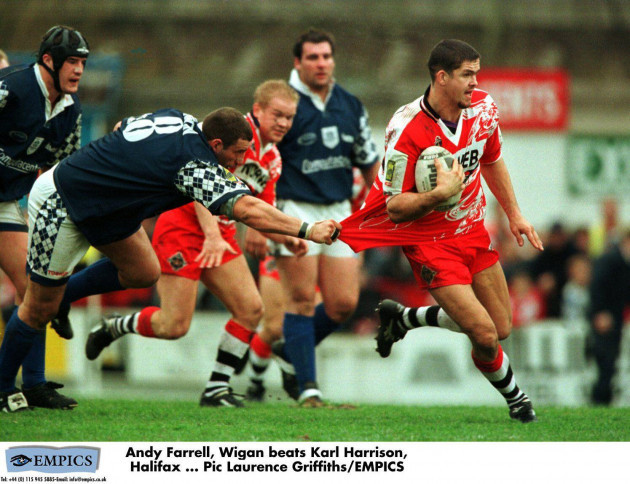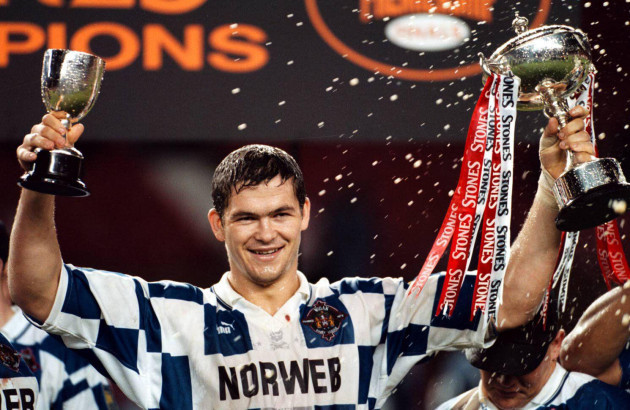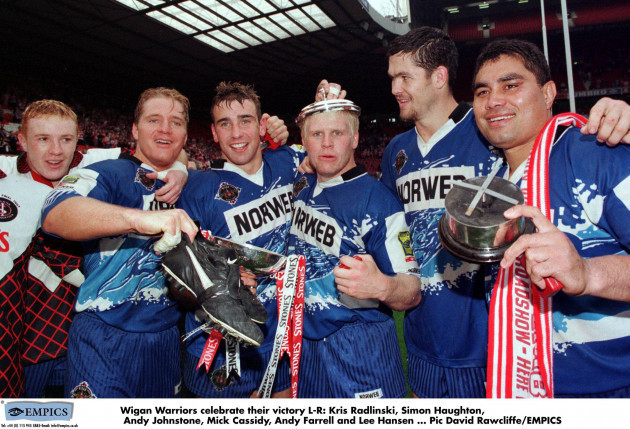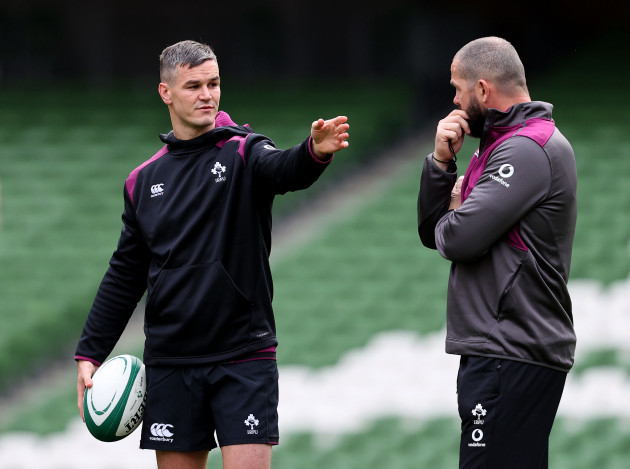MICK CASSIDY SETS a scene that’s somewhat vague and completely lacking any sense of glamour. It’s any old week in the mid-90s and Wigan Warriors are on the road again.
Cassidy is on the bus with 30 or so other men but the focus is fully on Andy Farrell. The Wigan captain is in his element.
“You’d be going to a Wednesday night game in some shithole place on a shitty night in the middle of winter and Andy’s just thinking about how we’re going to win this game. It was as simple as that. It could be a semi-final over in Leeds or a just a normal league game, there was no change in him.
“That’s what leaders are. It must be intrinsic, it must be self-driven. It’s a bit of an addiction nearly, you just want to win every game and compete. If he doesn’t do that, he’s not happy in himself.
“And Andy was driven by the legacy before him. When he came through as a youngster, he didn’t want to just be a Wigan player, he wanted to be Wigan captain.”
This is part two of a two-part piece on Andy Farrell’s rugby career in Wigan. To read part one, click here.
********
There’s a reason Wigan people light up when Andy Farrell’s name is mentioned. It’s partly down to the trophies and memories he helped deliver to the town across a glittering career with Wigan Warriors, but it’s just as much down to the fact he was one of them. He was the one who lived the dream and all the while seemed grateful for it.
“He used to stand behind the posts with his Dad and watch all the Wigan games,” says Farrell’s first coach, Haydn Walker.
“He’s Wigan to the core, there’s no doubt about that. He bleeds red and white. Loyalty is something that is a big thing to him. He only ever played for one amatuer club, which was St James’, he only played for one professional rugby league club, which was Wigan, and only played for Saracens in union. He’s committed once he’s with somebody.”
Commitment was a quality which marked Farrell out long before he made it inside the Wigan dressing room. By any measure, his teenage years were not normal. As a 14-year-old he’d head down to Warriors training sessions after school where the team’s trainer, Bob Lanigan, would work with him before and after sessions. At 16, in the gap between finishing school and the game turning professional, Farrell found himself working at the local council, Wigan Metro, learning a trade he had no intention of pursuing.
“He was a joiner and I was a plumber,” Cassidy recalls. “So we both went through and served our time. I don’t think he saw it as a his number one ambition if you know what I mean . . . I think he saw rugby league as his trade. He was destined to play rugby, and I think he was destined to be a leader.”
Farrell viewed the demands of his work at Wigan Metro as an inconvenience on his training schedule, so decided to add more hours to his day. At 6am, a group of senior Wigan players would meet him at the team gym to get a session in before they all dispersed to clock in for the day job. That work ethic stretched into the summer months, where Farrell and Cassidy would essentially get a full pre-season of their own in before joining the rest of the squad for pre-season training, the young academy prospects fuelled by a determination to chase down those already in the senior squad.
“A lot of the time we didn’t know what we were doing,” Cassidy admits, “but we felt if we worked hard and were blowing and sweating, then we’d done enough.”
Around this time, Walker saw a switch flick within Farrell.
“As he developed at 14, 15, 16 and a professional career was in front of him, then it’s the other aspects of being a professional that come into play. His preparation became better. He became a student of the game, always wanting videos of the games to analyse. He’d take a bag of balls home and practice his kicking. He started to really look after himself.”
On Sunday 24, November 1991, the hard work came to what had seemed an inevitable conclusion. At just 16, two months to the day from becoming a father, Farrell made his senior debut for Wigan, coming off the bench in a defeat of Keighley at Central Park.
“From 16 onwards he was a member of the first team squad, which would be very unusual, but not if you’re as talented as Andy was,” remembers Denis Betts, who was already well established in the team when Farrell first broke through.
In the coming years Betts would call Farrell a lot of things: teammate, rival, next-door neighbour, friend. Thinking back to the formative days of what would become a long-lasting friendship, Betts remembers being blown away by the big new personality in the dressing room.
It was just everything about him. Andy was one of the most talented people of his generation, if not many generations, but he didn’t rest on that. He had a work ethic. He was a naturally gifted sportsman – not just a rugby player, rugby was just something he excelled at.
“From the start, he was challenging everybody to be better. He was winning the shuttle runs, he was winning the long runs, he was the strongest in the gym. As a player he came into a group of people that were committed to winning and just jumped straight in and became part of that group.”
It had long been clear Farrell had the talent but now that he was mixing it in senior rugby, he could prove he had the toughness. In a sport full of exceptionally hardy men, Farrell was exceptionally hardy.
“When he played his first game for Wigan I was really proud, but I was also thinking ‘he’s only 16, don’t hurt him!’” says Walker.
But his pain threshold is not normal. Even when he played a year above his age level, the lads who were a year older didn’t want to be humiliated so they were really getting into him, but it didn’t bother him.”
Farrell’s emergence came at an important time in the town’s history, and goes some way to explaining why he remains so revered. When Farrell became a Warrior in 1991, male unemployment in Wigan was at its highest level since the 1930s, touching 14%, some way above the UK average. The Warriors had won a single championship across the previous decade (1987) but started the 90s on a high with a league and cup double in 1990. By the time the new millennium arrived, Wigan would be regarded as one of the greatest teams in the sport’s history, with Farrell the central figure, winning seven league titles and five Challenge Cups before Central Park was knocked to the ground in 1999. During this period, Wigan made history as the first team to win six consecutive doubles.
In 1996, Farrell won the prestigious Man of Steel award for the first time, and would be the last Wigan player to receive the honour until he found himself back on the podium in 2004, his last year playing league. To this day, only one player has won the award more than twice in their career.
In short, the early 90s’ was a good time for a new hometown hero to arrive on the scene.
“I’m not a Wiganer but I always feel like I am,” says Betts, who was born in Salford. “I came to the club as a teenager and it does that to you. Being part of Wigan, it’s one of things where you’ll always feel like you’ve got somewhere to call home. So if you’re a Wiganer, and with what Andy did for the town and with the town, it does mean more. He just bleeds being a Wiganer and wants to be a Wiganer. Most Wiganers are like that.”
********
Emboldened by a promising start to his Wigan career, Farrell’s new life began to take shape. He’d turn up to training with his infant son in tow, lace up his boots and without fail, proceed to be one of the best players on the pitch. By 17 the loose forward was a regular in the Warriors team. By 18 he was a full international. At 21, he became Wigan captain.
“He would lead by example,” Cassidy says. “He’d be very vocal in the dressing room, he’d be vocal on the pitch, and he wouldn’t hold back; if he thought you weren’t pulling your weight he’d give you shit and tell you what he thought of you, but you knew he was telling you for the right reasons. Not all players have that, but you knew he just wanted to win and also wanted you to be the best player you could be.
Then at training, just really intense. It could be just a skill session or a running session, everything had to be nailed or he wouldn’t be happy with it, and you’d carry on until he was happy with that session.
“He was massive on skills, and he wouldn’t be afraid to bring an idea to a coach. Most coaches respect that, but there’s not many players who would have been strong enough to bring that idea. Andy was willing to try things even if they didn’t work. He’d rather try something and make a mistake than sit back and not try anything.
“And after a loss, you just knew the next session was going to be a tough one. He always wanted to lift the team to higher standards. If anybody weren’t pulling their weight or feeling a bit sorry for themselves, they’d be getting it in training from him.”
Ask Wigan fans for a favourite Farrell game and they’ll often mention the day he broke his nose against Leeds and had to leave the pitch twice, but still managed to steer the team to victory. Ask his former teammates, and they say they can’t pick one.
“He never had a bad game,” says Betts. “He might tell you that he hadn’t hit certain standards or done certain things, but he was consistently above everybody else. It was never a 7 or 8, he was always an 8 or a 9.”
As a fellow second row Betts saw the Farrell effect up close on the pitch. As the years rolled by and the trophies rolled in, Farrell’s rise resulted in him taking Betts’ place in the team and also replacing him as captain. Still, the relationship never soured.
Amdy Farrell and the Broken Nose against Leeds in June 2004. pic.twitter.com/eSoQtDmVtw
— Wigan RL History (@WiganRLHistory) October 14, 2019
“I was being challenged by him and then I was trying to challenge him when he overtook me quite early. I was always chasing him up hills and trying to lift as much as him in the gym, and it became a little bit of a burden.
“He was ruthless. Ruthless in his whole mentality; do the right thing, make sure you do your job, I’ll do my job, holding people accountable and holding himself accountable. He was always pretty ruthless because he wanted to win, but that’s because he worked really, really hard to put himself in that position.”
Away from that hard edged, dogged competitor, there was another side to Farrell. Everyone The 42 spoke to for this piece made a point of mentioning both the Farrell family, and that of his wife, Colleen, who also came from a strong rugby background.
“Andy was just always a really good bloke,” Betts continues. “A big character. Owen was always around the team and was part of everything that went on. And you look behind Andy (now), you look at Owen, he’s obviously pretty competitive, and you look at Colleen and how supportive and family-orientated she is as well. She’s a big part of everything Andy is.
“For me, it’s never been Andy Farrell the great coach or the great rugby player, it’s Andy Farrell the bloke, the family man, the friend. That’s who he is. He just happened to be an exceptionally talented rugby player, but he’s an exceptionally great human being.”
********
Farrell’s days as a rugby league star started and ended in Wigan. From there, he made the switch to union, representing Saracens and England before embarking on a new life in coaching. It wasn’t long before the RFU came calling but England’s disappointing showing at a home World Cup in 2015 meant the axe fell on Stuart Lancaster and his coaching team.
Move to the current day and Farrell is a Grand Slam-winning head coach who has masterminded arguably Ireland’s greatest ever side. Cassidy and Walker both say that when they sit down to watch Ireland, they can see Farrell’s imprint all over the team.
“It’s in how they play,” Cassidy explains, “the skill level with each player. You look at the Irish forwards passing, they have these great little passes all the time and even if one doesn’t go to hand, they don’t go within themselves. Some teams, if doesn’t come off they stop playing that way. But the Irish at the minute aren’t bothered if they make a mistake because they know what they’re doing is right.”
Walker remembers coming across an interview with Farrell a few years ago, and being touched by a mention from his former star player.
“He said that I really cared about my players, which I did, and you can see that in him.
He cares about those players in Ireland. And this is why I always thought he’d be a good coach, one of the things that sets him out from other top sportsmen is his humility. He’s a very humble person.
“That’s one of the reasons he’s having the success he’s having. Attention to detail is another one, another little 1%. And you can see that in some of the things Ireland do. He’s not afraid to think outside the box and try something different, and he’s certainly empowering the players.”
“He’s just honed his skills,” Cassidy continues. “That’s the difference between being a player and a coach. As a player, you’re on a par with each player and can give them some shit to their face. As a coach, you need to bring yourself down to that player mentality and get to know how best to drive them. He can obviously do that.
“And when you look back . . . If you can achieve what he did as a youngster coming through in a team like Wigan with so many strong players around him, and then to develop those skills and go on to have the respect he has within the game. Well, it’s not surprising to see where he’s gotten to.”
“I loved that quote when he first got the Ireland job, where he was asked what Owen had said to him – Owen’s reply was ‘about time!’” laughs Betts, who also coached Farrell at Wigan after his own playing career ended.
“When I first took over at Wigan I thought I was a good coach. It was only after a while that I realised I wasn’t that good, I just had Andy in my side.
“He’s always been a head coach, he’s just been in waiting really.”
The42 is on Instagram! Tap the button below on your phone to follow us!





